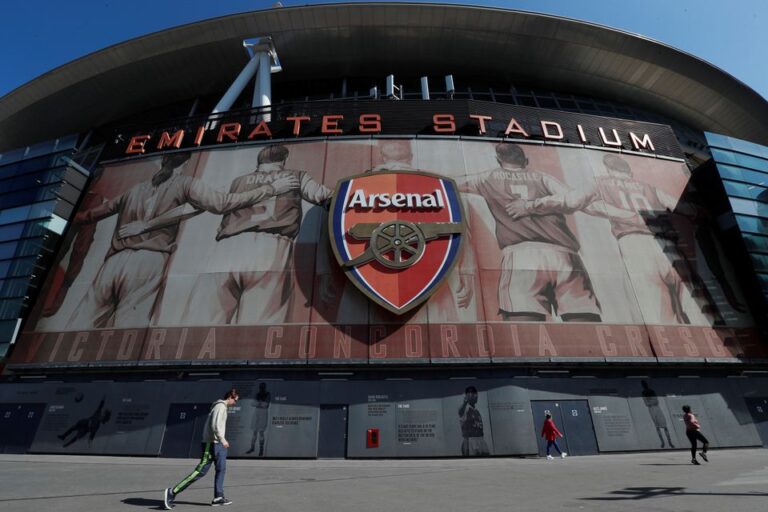
(Reuters) —European soccer’s governing body UEFA led a backlash against plans for a breakaway Super League on Monday, saying associated players and clubs could be banned from its competitions – including three of this season’s Champions League semi-finalists.
Addressing an emergency meeting the day after 12 of Europe’s top clubs announced the new league, UEFA president Aleksander Ceferin described the Super League plan as a “spit in the face” of all football lovers.
“As soon as possible they (the clubs) and the players have to be banned from all our competitions,” he added.
Three of the 12 clubs in the new league – Real Madrid, Manchester City and Chelsea – could be withdrawn from this season’s Champions League semi-finals, UEFA executive committee member Jesper Moller told Danish broadcaster DR.
“The clubs must go, I expect that to happen on Friday. Then we have to find out how to finish (this season’s) Champions League tournament,” said Moller, who is the head of the Danish FA.
The renegade clubs – six from the English Premier League plus three each from Spain and Italy – will be guaranteed places in the new competition in contrast to the Champions League, which requires teams to qualify via their domestic leagues.
U.S. investment bank JP Morgan is financing the new league, providing a 3.5 billion euro ($4.2 billion) grant to the founding clubs to spend on infrastructure and recovery from the impact of the COVID-19 pandemic.
Britain will do everything possible to block the league and is examining options to penalise the six English teams that have signed up, sports minister Oliver Dowden said on Monday.
Prime Minister Boris Johnson was quick to object to the plans on Sunday, and Dowden said the government would seek to block the project if football authorities could not.
“If they can’t act, we will,” he told parliament. “We will put everything on the table to prevent this from happening.”
‘DISGRACEFUL PROPOSAL’
UEFA chief Ceferin said the Super League went against the core of the European football pyramid in which all clubs can dream of playing in the Champions League.
“We stand united against the disgraceful and self-serving proposal for a select few clubs in Europe motivated by greed. We are all united against this nonsense of a project,” he added.
“As previously announced by (soccer’s world governing body) FIFA and the six (continental) federations, the players… in teams that might play in the closed league will be banned from playing in the World Cup and Euros.
“We’re still assessing with our legal team but we will take all the sanctions that we can.”
FIFA had warned in January that any breakaway league would not be recognised by them and that players taking part could be banned from the World Cup.
Bans or other sanctions could open the way for complicated legal battles. The Super League letterurged FIFA and UEFA to agree to talks and said they wanted the breakaway league to exist alongside current European club competitions.
CHAMPIONS LEAGUE
The UEFA meeting was originally scheduled to confirm plans to expand the Champions League from 32 to 36 teams and create more group stage games before the knockout rounds, a move designed to appease the top clubs.
Ceferin said the new format would start from the 2024/25 season but it has been overshadowed by the Super League announcement. He also stressed that UEFA distributes close to 90% of its revenues back to all levels of the game.
“Super League is only about money, money of the dozen, I don’t want to call them dirty dozen, but UEFA is about developing football.”
While guaranteed spots in the Super League go against long-standing tradition in European football, the founding clubs argue it will create a more sustainable financial model.
“The formation of the Super League comes at a time when the global pandemic has accelerated the instability in the existing European football economic model,” the clubs said.
In the past, breakaway threats have led to compromise between UEFA and the big clubs in the Champions League, over the format and revenue distribution.
FOUNDING MEMBERS
As well as Manchester United, owned by the American Glazer family, U.S-owned Premier League clubs Liverpool and Arsenal, Abu-Dhabi backed Manchester City, Russian-owned Chelsea, and Tottenham Hotspur, who sacked their manager Jose Mourinho on Monday, have signed up to the plans.
Barcelona and Atletico Madrid join Real Madrid from Spain, while AC Milan and Inter Milan make up a trio from Italy along with Juventus.
Qatari-owned Paris St-Germain and European champions Bayern Munich, which is majority-owned by its fans, have not signed up, meaning France and Germany are not represented.
The Super League said they aimed to have 15 founding members and a 20-team league with five other clubs qualifying each season and would start playing as “soon as is practicable”.
Fans of clubs involved have united in condemnation as have major European domestic leagues and football federations. French President Emmanuel Macron and Italian Prime Minister Mario Draghi have also voiced concerns.
British broadcaster BT Sport, which pays hundreds of millions of pounds a year to show the Champions League, said the game needed to be protected.
“BT believes the formation of a European Super League could have a damaging effect to the long term health of football in this country,” it said.






